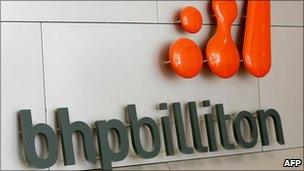BHP Billiton profits rise to $19.6bn
- Published

Mining giant BHP Billiton has seen its annual profits rise nearly 70% thanks to a recovery in commodity prices.
The company said it made $19.6bn (£12.7bn) in the 12 months to June, up from $11.6bn made in the previous year.
Last year's results were hit by a slump in demand for commodities following the economic crisis.
In its results BHP gave no update on its $40bn bid for fertiliser maker Potash Corp, which was rejected by the company's board last week.
But speaking to reporters later, BHP's chief executive Marius Kloppers said the company would not overpay for the company.
"Let me stress, as always, we will remain disciplined," he said.
Analysts suggest BHP will now have to table a higher offer in order to win round Potash Corp shareholders in a hostile takeover.
Mixed outlook
The miner's results suggest it is in a strong financial position, with the rising price of iron ore and copper boosting sales.
Revenues for the year were up 5.2% at $52.8bn, while BHP's debts fell to $3.3bn.
But BHP said the outlook for commodities was mixed, with high prices dependent on continued strong demand from emerging markets.
The company said that China, its biggest customer, is expected to see slower growth over the coming years, but that strong spending on commodities like iron ore should continue.
"Domestic consumption is expected to remain strong and investment spending is likely to remain commodity-intensive," it said.
BHP has been among the mining companies to benefit from China's huge appetite for raw materials to fuel its booming economy in recent years.
BHP admitted that the outlook for economic growth in the rest of the world was "uncertain", with austerity measures planned by many governments expected to limit economic growth.
"Significant public spending cuts and higher taxes have been announced in Europe, however, [they] are yet to be fully implemented, implying the inevitable negative impact on growth," it said.
- Published17 August 2010